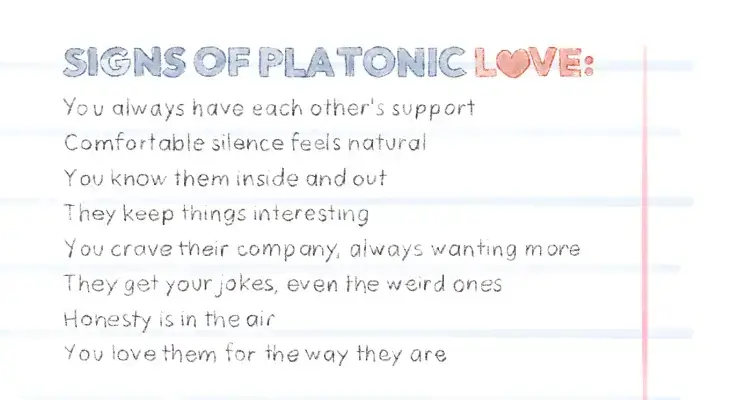Have you ever felt a deep connection without romantic feelings? You trust them entirely and always support each other. Millennia ago, Plato explored this concept. He called it platonic love, a powerful connection that transcends the physical.
In this article, we will explore the meaning of a platonic relationship and the signs you have one, as well as discuss the key boundaries of platonic love.
What is platonic love?
Generally, love is the foundation of many strong bonds we share. It’s about respect, care, and a deep connection without the complexities of romance. This term comes from the ancient Greek thinker Plato, who explored love in his writings. “Platonic love” is named after Plato due to his discussions about love in his work Symposium [1]. In his work, he talked about how to love someone as a perfect form of beauty, not just physical attraction.
What does a platonic relationship mean?
A platonic relationship means a close friendship in which one enjoys being close to someone without the whole romance part. It’s like having a friend you can totally be yourself with, share your dreams and worries, and know they’ve got your back. Still, it’s not a term for “friendship” either.
There is also a difference between platonic love and romantic relationships. The first one doesn’t involve the desire for physical intimacy, though physical touch as a love language can play a role in both romantic and platonic relationships.
| Aspect | Platonic Relationship | Romantic Relationship |
| Emotional Connection | Deep emotional bond without romantic attraction | Includes romantic and often physical attraction |
| Commitment Level | Flexible, based on mutual friendship | Often involves an exclusive, long-term commitment |
| Physical Intimacy | Typically non-sexual (e.g., hugs, handshakes) | Often involves physical and sexual intimacy |
Platonic relationship vs. friendship
Friendships and platonic relationships also might look like they’re close cousins, but there are some nuances to consider:
- Clarifying the Terms: “Platonic love” is often explicitly called relationships without a sexual component, especially in contexts where such interest might be taken or typical. “Friendship” is a more general term that covers a broader range of connections without specifically excluding the potential for romantic feelings.
- Depth and Intensity: While not always the case, platonic intimacy can be seen as a specific subtype of friendship that underlines a deeper, more intellectual, or spiritual connection.
4 signs your relationship is platonic
Here are some common signs to define if you have a platonic relationship in your life:
- Vulnerability: You can share your true self, knowing they’ll listen without judgment. This honesty builds a foundation of trust that lets the friendship grow deeper.
- Understanding: You respect each other’s boundaries and space. For example, your platonic soulmate might be introverted and need some alone time after a social event, and you understand completely.
- Connection: You find common ground, whether it’s shared interests or just a feeling of mutual understanding. Maybe you both love discussing philosophy over coffee or have a shared sense of humor that makes you laugh over the most mundane things.
- Acceptance: You appreciate each other for who you are, flaws and all. This creates a safe space to be yourself. For example, you might only sometimes agree with your friend’s taste in music, but you still enjoy going to concerts together because you appreciate their enthusiasm.

3 examples of platonic relationships
Here are a few terms that describe various platonic bounds.
1. Close Companions: These describe solid and affectionate bonds between people (sometimes called “womance” or “bromance“). These are friendships where two people are incredibly close, but without being related.
2. Office colleges: Have you ever had a colleague you trust completely? Someone you bounce ideas off, and who cheers you on? That’s a “work spouse” and it’s a purely platonic relationship.
3. Learning partners: Mentors and mentees can develop strong bonds based on mutual respect and a shared passion for learning.
Why platonic relationships may not work
In fact, platonic love is a cornerstone of a healthy social life. However, there are definitely challenges that can arise in platonic friendships:
- Unrequited feelings: Sometimes feelings change, which can be awkward, especially if one person wants more than friendship but eventually finds themselves in a friend zone. Talking things out honestly can help.
- Mismatched expectations: We all have different needs in friendships. If someone wants more support than you can offer, or vice versa, it can be challenging. Open communication is key here.
- Friends can get jealous: Just like in any relationship, a little jealousy can pop up, especially if our friend spends much time with someone new.
If you want to keep it healthy, prioritize the boundaries of platonic friendship (or rules) for a strong connection. This could include things like:
- Friends & partners: respect both. No gossiping or complaining about your partner.
- Keep it friendly with friends. Kissing or hand-holding would already mean something else.
- Prioritize commitments, but friends get it (plans).
- Partners should know about close friends, so don’t try to hide your platonic relationship from your partner. Be open.
- Space should be healthy. Give each other room.
- Time for all. Find time for your partner as well as for your platonic relationship.
4 reasons to engage in platonic love
- Healthier emotionally and physically: Researchers found that platonic relationships can actually improve your health [2].
- Emotional support: Your platonic soulmates are your emotional safety net. They listen without judgment, cheer you up, and help you navigate life’s ups and downs.
- Friendship: The Missing Piece? Romantic partners can’t be everything, and that’s perfectly okay. Platonic relationships can fill the gaps, offering shared interests, or simply a different perspective.
- Personal growth: Platonic relationships can help you grow as a person. Friends can challenge, inspire, and help you see the world differently.
Did you know there’s even a growing trend in TikTok of platonic dating? People choose to share their lives without the romantic element, similar to romantic partnerships but focus on a deep friendship instead of romance.
They may get platonic marriages, share a home and expenses, and raise kids together as close friends. Therefore, “platonic crushes” enrich our lives in countless ways.
Sources:
- Merriam-Webster.com Dictionary, s.v. “platonic love,” accessed January 20, 2025.
- The Anatomy of Friendship, Dunbar, R.I.M. rends in Cognitive Sciences, Volume 22, Issue 1, 32 – 51
Disclaimer
This article is for general informative and self-discovery purposes only. It should not replace expert guidance from professionals.
Any action you take in response to the information in this article, whether directly or indirectly, is solely your responsibility and is done at your own risk. Breeze content team and its mental health experts disclaim any liability, loss, or risk, personal, professional, or otherwise, which may result from the use and/or application of any content.
Always consult your doctor or other certified health practitioner with any medical questions or concerns
Breeze articles exclusively cite trusted sources, such as academic research institutions and medical associations, including research and studies from PubMed, ResearchGate, or similar databases. Examine our subject-matter editors and editorial process to see how we verify facts and maintain the accuracy, reliability, and trustworthiness of our material.
Was this article helpful?




